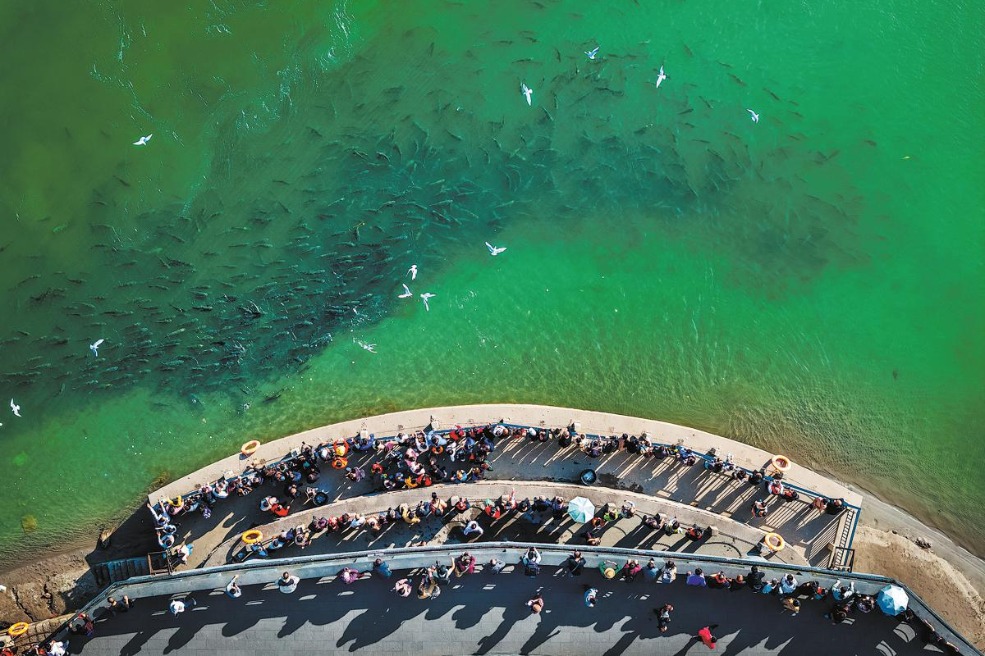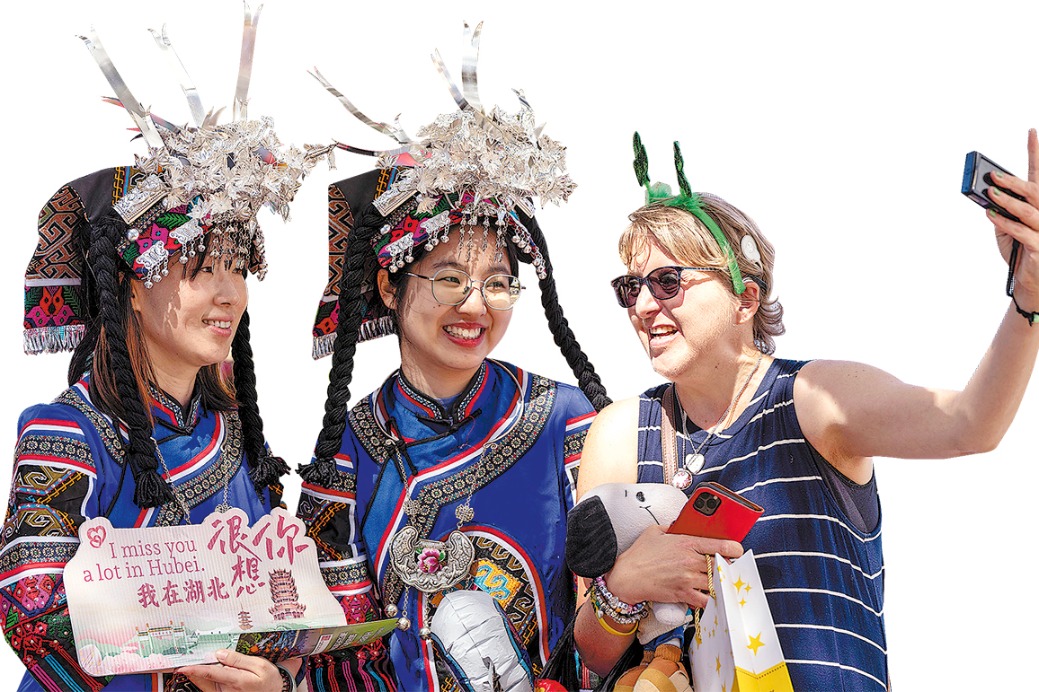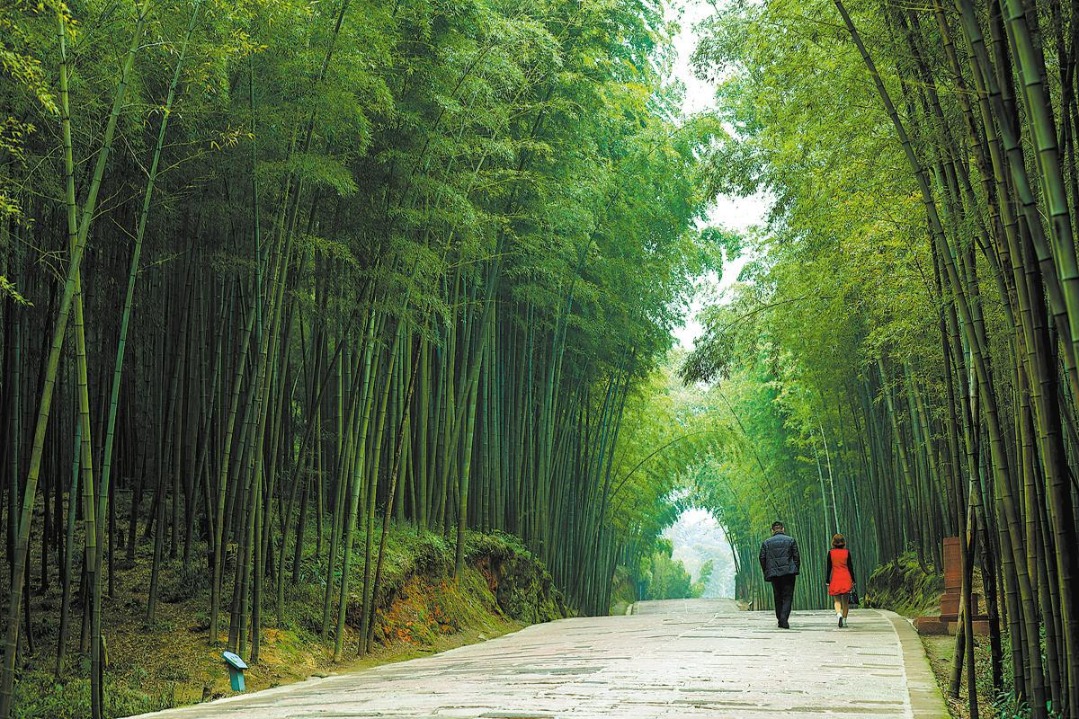SOW WHAT YOU REAP
By mixing high-efficiency agriculture with rural tourism practices, a small town in Jiangsu has reversed its fortunes and created a prosperous environment for its local villagers.

Ye Minglan is cheerfully leading her guests on a red-carpet tour through the labyrinth of strawberry plants in her greenhouse.
"The route was where President Xi Jinping walked through when he visited us in 2014," Ye says with pride. Ye's family rented 6 mu (0.4 hectares) of land in Xianfeng village, Shiye town, Zhenjiang city in East China's Jiangsu province, and began to grow strawberries there in 2013.
Ye took over the land after it was rented out to two college graduates in 2012, who gave up after just six months.
"They grew cucumbers, but they couldn't develop any marketing channels," Ye says.
After consulting with agriculture experts, Ye's family settled on agricultural tourism as a business plan.
All their strawberries are planted on the top row of stacks of high shelves, which are filled with a patented formula wrapped up in membrane.
The formula was developed at an agriculture science institute in Zhenjiang and contains a mix of rich ingredients, from rice husks to turfy soil, which are fermented at high temperatures.
"This way, the strawberries can be kept free from dust and pestilence," Ye says.
Ever since Xi's visit to Shiye town, Ye's strawberry greenhouse has grown increasingly popular.
Tourists continue to flock to her garden to pick strawberries during the weekends and holidays.
"Around 300 people come here to pick fruit on a good day," Ye says.
On certain days, she receives seven or eight groups of business guests who visit her greenhouses to study how high-density agriculture operates.
Over the years, Ye's family has expanded their plantation to more than 110 mu, where they now grow six varieties of grapes, two types of strawberries and three different kind of peaches.
Tourists are able to pick fruit throughout the year. The strawberry season runs from November to May, peaches and loquats from April to July, and grapes from June to November, she says.
To date, her sales of grapes per mu exceeded 10,000 yuan ($1,423), and her strawberries bring in around 40,000 yuan.
The success of the fruit plantation has also brought about positive changes to the lives of the local villagers.
At the moment, Ye's plantation employs 18 villagers who earn a total annual income of around 400,000 yuan.
Professional guidance is provided to the staff, and covers every step of the process from seed planting to growth management.
"During harvest seasons, we hire extra help," Ye says.
Ye's business is one of many that have benefited from the development of high-efficiency agriculture and the rise of rural tourism in Shiye town.
"All of our income relies on agriculture now, rather than industry," says Nie Yongping, deputy head of the town. The local authority has also set up two agriculture companies to further tap into its land potential.
They aim to develop farm produce with a higher economic return to maximize land values and further enrich local life, Nie explains.
One business has introduced pecan nuts as a cash crop, while the other has grown dendrobium officinale, which is often used in traditional Chinese medicine.
The majority of the town's farmland is already being effectively used, according to Nie.
The town used to be one of the poorest of its kind in Zhenjiang, but it quickly rose above the national poverty line in 2016 after developing agricultural and rural tourism. Per capita income is expected to reach 29,000 yuan this year, compared with 12,000 yuan in 2014 and 17,000 yuan in 2015, Nie says.
Now, older villagers can make a decent living by engaging in organic agriculture production or by simply leasing their land out for it.
In the past, most rural households in the town only made between 500 and 800 yuan a year through traditional agriculture, according to Nie.
"Basically, villagers here have been freed from strenuous labor and have become technicians," Nie says.
The local government has made a point of developing rural tourism since 2005, when the Runyang Bridge was built, better connecting the town surrounded by waterways to the outside world-especially to Nanjing and Shanghai.
Many tourists visit the town to see the bridge and to enjoy a host of popular events that are increasingly being staged in Shiye.
Every year, more than 100,000 visitors descend on the town for the annual Yangtze River international music festival, Nie says.
More than 1 billion yuan has been invested to improve local infrastructure.
"Everything was quite primitive in our village," he says. "Many rivers and ponds were clogged up with silt and weeds ran wild.
"A network of wastewater pipelines and treatment facilities have been now installed, and rural toilets have been upgraded."
Efforts have also been made to improve local ecological environment.
"Asphalt roads were developed after Xi's visit and LED streetlights were installed," Nie says.
"We are also pushing for a garbage recycling system."
Sightseeing and health tourism experiences are also available in the town, and more options are in the pipeline. "We are promoting rural homestays and farmhouse experiences at the moment," says Nie.
Ye, too, has been working on upgrading the facilities at her fruit farm.
"Some old things, such as the roof membranes and the peripheral bird nets will need to be replaced to ensure everything is in top condition," Ye says.
She has also kept in touch with agriculture experts to keep abreast of the latest developments in planting technology.
"For instance, we now use fermented soybeans and cow dung as organic fertilizers to enhance the taste of our grapes," she says.
She believes these measures are necessary to meeting the constantly evolving tastes of her customer base. Ye is now considering sending her fruit to high-end markets in the nearby cities.
"Next year, we will have 40 mu of shine-muscat grapes hitting the market," Ye says.





Today's Top News
- Xi's book on governance hailed for insights into 'China miracle'
- European destinations swamped by tourists
- Economy expected to maintain steady pace
- Stable, healthy Sino-US ties benefit all
- CPC plenum to focus on next five-year plan
- Talks highlight the fact that cooperation benefits both sides, confrontation harms both






























